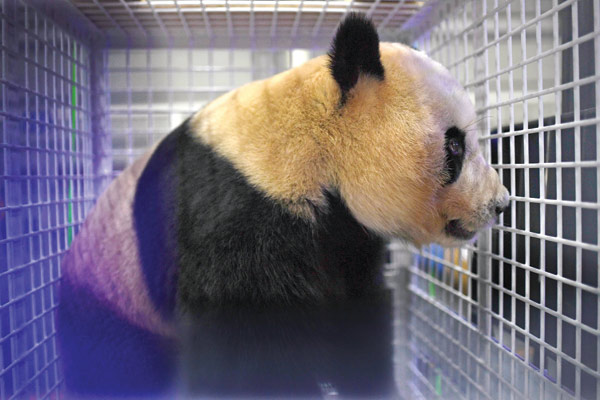Pandas born overseas are always returned to their ancient homeland
 |
|
Hai Bang relaxes after his return to China. |
Hai Bang, a 7-year-old male panda, slowly walks toward keeper Long Bowen when tempted with a slice of apple and a request in the dialect of China's Sichuan province.
Long hands over the apple to reward Hai Bang's obedience.
"Hai Bang and his two sisters can understand my simple instructions when I have a slice of apple in my hand. They know they can be rewarded with an apple slice when they follow me," said Long, a young keeper at the Chengdu Research Base of Giant Panda Breeding in Southwest China's Sichuan province.
Hai Bang, Yang Bang and You Bang were born at the Adventure World amusement park in Shirahama, Wakayama prefecture, Japan, in 2010 and 2012. Hai Bang and his sister Yang Bang are a pigeon pair. You Bang is female.
The mother of the three pandas, Liang Bang, was born in Chengdu in 2000 and now lives at the Adventure World amusement park in Japan.
Since the three pandas' return from Japan on June 6, keeper Long and another experienced keeper have cared for them during a month-long quarantine at the Chengdu panda-breeding base. The trio will meet visitors after the quarantine is over.
After their return to the base, a Japanese keeper stayed with them for several days to help them adjust. That keeper brought a supply of bamboo from Japan, in case it tasted slightly different from the bamboo at the base, again, an attempt to smooth the transition.
"Now they like bamboo in Sichuan and they together take in more than 200 kilograms of bamboo shoots a day. You Bang has a special love for buns made of corn, soybean and oatmeal," said Long.
You Bang is very clean. When she wakes up to answer the call of nature at night, she moves well away from her sleeping area, he said.
One major reason why the three pandas were brought back from Japan was the fact that the animals had reached sexual maturity and needed mates.
Despite none having had mates, Yang Bang recently had a phantom pregnancy during which she ate much less, slept far longer, and did not take exercise. Such conditions can be harmful to the pandas' health. Before their return to China the pandas were clearly desperate to find partners, said Chen Cheng, an information officer at the Sichuan panda breeding base.
Back in 1994, with the approval of China's central government, the base began collaborating on panda research and breeding with Adventure World. Fifteen panda cubs have been born at the park. Eleven of them are now back at the Chengdu base.
Under an agreement related to the preservation and protection of China's giant pandas, animals loaned by China to other countries still belong to China and any offspring born overseas belong to China and must be returned before they turn 2. The three pandas born in Japan ended up having their stays extended.
Pandas have a strong ability to adapt to new homes and all overseas-born pandas returned to China quickly feel at home, said Zhang Hemin, executive director of the China Conservation and Research Center for the Giant Panda in Wenchuan county, Sichuan.
Visitors often ask whether pandas that are returned from overseas can understand keepers in China.
According to Wu Kongju, a senior keeper at the base, all young keepers graduated from college and can speak some English. But she does not believe pandas can understand human languages, whether they are Chinese or others. Wu said pandas get to know the meaning of a few words that keepers use frequently.
Sichuan province, which is home to more than 80 percent of China's pandas, has worked with more than 10 countries, including Germany, on panda conservation. On June 24, a pair of giant pandas left Chengdu on a 12-hour journey to Berlin, where they will remain for 15 years, during which time they will be the subject of joint scientific research between the zoo and the Chengdu Research Base of Giant Panda Breeding.
It is the third time Berlin's zoo has hosted giant pandas, said Zhang Hemin.
In 1980, after West German Chancellor Helmut Schmidt visited China, Beijing sent Bao Bao and Tian Tian as a state gift to the country.
Tian Tian died in 1984, but Bao Bao lived to the ripe old age of 34, the equivalent of 102 in human terms, dying in 2012.
In 1995, China loaned Yan Yan, a female panda, to Berlin to be Bao Bao's partner. She died in 2007 at the age of 22.
Contact the writer at huangzhiling@chinadaily.com.cn
























